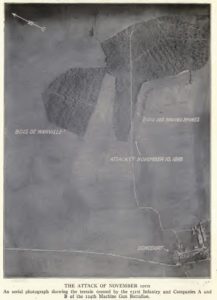 A series profiling American Jewish service in the First World War
A series profiling American Jewish service in the First World War
Samuel I. Trachtenberg
Immigrant Soldier
On the eve of war, Samuel Trachtenberg considered himself something of an immigrant success story. He was a native of Korostyshev near Kiev who’d come to the U.S. as a 17-year old in 1908. He wrote that he’d spent his youth in the Russian empire studying “talmood, etc.” But his early days in the U.S. were “friendless, moneyless, tradeless and languageless.” Despite this, Trachtenberg managed to educate himself in his new home. He graduated from high school and had two years of college. In 1917, when the U.S. entered World War I, he was a student at Chicago-Kent College of Law. He’d also worked jobs as an assistant manager in a wholesale cigar store and as a supply clerk.
Trachtenberg didn’t want to join the Army. It would interrupt his studies and his job which allowed him to help support his parents who were still in Russia. There were also 5 siblings dependent on Trachtenberg’s aid. But he dutifully registered for the draft and when he was called, Trachtenberg was off to train as a soldier. He entered the service with the 344th Infantry before being transferred to Company K, 131st Infantry, 33rd Division.
 The 131st left from Hoboken, New Jersey for France on May 15, 1918. The trip aboard the USS Leviathan across the Atlantic was eventful. The ship had to deal with German submarines for much of the voyage. But it was with the coast of France nearly in sight that the worst trouble came. Four U-boats appeared off the ship’s stern. Fortunately the Leviathan’s gun crews were on alert. Their fire forced the Germans back under the sea before torpedoes were fired. Two of the U-boats were destroyed and one forced to surrender.
The 131st left from Hoboken, New Jersey for France on May 15, 1918. The trip aboard the USS Leviathan across the Atlantic was eventful. The ship had to deal with German submarines for much of the voyage. But it was with the coast of France nearly in sight that the worst trouble came. Four U-boats appeared off the ship’s stern. Fortunately the Leviathan’s gun crews were on alert. Their fire forced the Germans back under the sea before torpedoes were fired. Two of the U-boats were destroyed and one forced to surrender.
There must have been a deep sense of relief when Private Trachtenberg arrived safely in Brest, France with company K on May 30, 1918. But a month later they were in the war zone. Trachtenberg saw plenty of action. He was at the Battle of Albert, Gressaire Wood and Chippily Ridge, Verdun, Meuse-Argonne, St. Mihiel. On November 10th, Trachtenberg was just a day away from escaping the war without injury. But that day, the regiment was ordered to attack Bois d’Harville, one of the last strongly held German positions preventing the Americans reaching the forts at Metz. The men of the 131st were met with heavy machine gun and artillery fire at all points of the attack. Support was supposed to be provided on both flanks, but it never arrived. Nevertheless, the Americans managed to gain ground toward Metz.

But the cost was high in wounded men. Private Trachtenberg was shot 12 times in both legs, both thighs and his right hand. The next day as his comrades planned to continue the attack, news of the armistice arrived at 8:30am. Fire continued for several hours before finally coming to a stop. As Trachtenberg began the healing process in a hospital, the war had ended. Trachtenberg spent time at a series of hospitals before being discharged on June 7, 1919. He returned to Chicago where he married Mollie Fox in 1920. He lived there until his death in 1953.